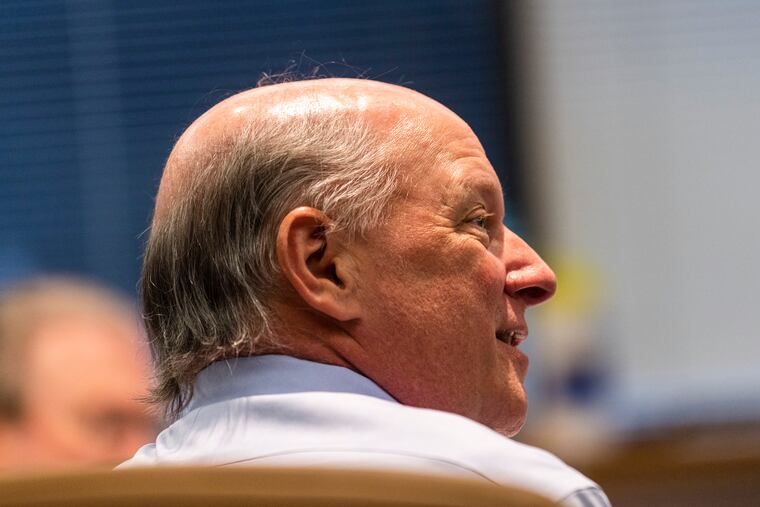Gov. Wolf: Make PSERS investigation results public
Wolf said transparency was important for the $73 billion public pension fund. But an outside lawyer for the fund said transparency might not be “the right answer.”

Gov. Tom Wolf on Wednesday called on the state’s biggest pension fund to make public the result of its investigation into the plan’s exaggerated investment results and Harrisburg land deals, soundly rejecting suggestions that the fund would need to keep the probe secret to safeguard the reputations of top staff.
Wolf, who has influence over a bloc on the PSERS board, weighed in on the issue after the law firm that conducted the investigation warned of legal risks with naming names in any public release of the probe’s results.
“The governor supports increased transparency,” Wolf’s press secretary said in a statement. “Making investigation results public would increase transparency and reassure the retirees and current members.”
Wolf’s stand was in contrast to cautionary remarks made at PSERS’ last board meeting by the outside lawyer heading the investigation. The lawyer, Claire J. Rauscher, advised the board two weeks ago that transparency might not be “the right answer,” warning the panel that some staff would see the probe results as damaging and as containing “derogatory” information, sources said.
After months of controversy over PSERS — fueled by ongoing probes by the FBI and federal regulators, along with the in-house inquiry by Rauscher’s law firm — the debate over the fund’s operation appears to be coming to a head. Some on the PSERS board, The Inquirer has learned, are seeking a resolution under which its two top officials — chief executive Glen Grell and investments leader James H. Grossman Jr. — would step down from day-to-day duties.
» READ MORE: EC’s probe of Pa. school pension fund examines staff gifts and trips from Wall Street firms
Officials with PSERS, the $73 billion Public School Employee Retirement System, which serves 500,000 working and retired teachers, did not respond to a request for comment. Nor did Rauscher, of the Womble Bond Dickinson law firm.
PSERS hired Womble and other law firms after the system’s board admitted in March that the fund had botched its crucial official calculation of investment returns. The chastened board adopted a new, lower figure in a reversal that under state law forced the fund to increase payments into the system by 100,000 working teachers and other educators.
Within days of the board’s admission, the U.S. Attorney’s office in Philadelphia subpoenaed PSERS leaders and documents to dig into the calculation mistake. The subpoenas, obtained by The Inquirer and Spotlight PA, also asked about the fund’s purchase of industrial real estate near its headquarters in Harrisburg.
In September, the U.S. Securities and Exchange Commission joined the probe of the calculation effort. Its subpoena also revealed it was looking, in part, into whether any fund staff received gifts from or gave gifts to firms that do business with the system.
Even as Womble wraps up its investigation, PSERS and the law firm itself appear to be proceeding cautiously. Rauscher told the board at the last meeting that her team had not even put its findings into writing for its client.
PSERS advisers have urged the board to consider staffers’ “Simon rights” before disclosing investigation findings. Those stem from a 1996 ruling, Simon v. Commonwealth of Pennsylvania, in which Commonwealth Court blocked a state crime commission from linking people to organized crime without letting them dispute that in advance.
Rauscher said that, under this precedent, those subjected to criticism in her law firm’s review have the right to see any written report beforehand and to argue for changes or to attach a statement giving their side. She said several unidentified staffers had already contacted her firm to demand this.
In a public statement, Matthew Haverstick, a lawyer for Grossman, the investments chief, said that he had every right to protect his reputation.
“As an employee of the organization, he did what he was told to do and didn’t do anything wrong,” Haverstick said. “I am not worried about truthful criticism of Jim, I am worried about someone falsely maligning Jim because it’s been happening for months.”
While Rauscher has revealed almost nothing of substance about her firm’s findings, she did say at a board meeting that Womble had found no evidence of criminal wrongdoing.
As the Simon decision noted, Pennsylvania’s constitution lists reputation as an inherent right. The U.S. Constitution does not do that, and very few state constitutions do, either.
As a result of the 1996 ruling, the results of various investigations over the years have been heavily censored or have included lengthy exculpatory statements from people identified in the reports. Most notably, the Pennsylvania appeals courts in 2018 forced Attorney General Josh Shapiro to black out the names of about a dozen allegedly abusive priests from a grand jury report on the sexual harming of children.
As for Wolf, who appoints three of the 15 PSERS board members, he acknowledged that there are limits to his ability to influence disclosure of the internal investigation. He noted that PSERS is an independent agency.
In his brief statement, issued by press secretary Elizabeth Rementer, Wolf also said, “The board’s priority should be restoring the confidence of retirees and current members of the system that their promised retirement benefits are protected and available for their benefit.”